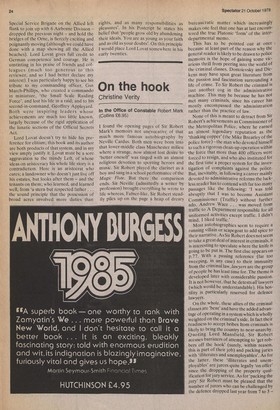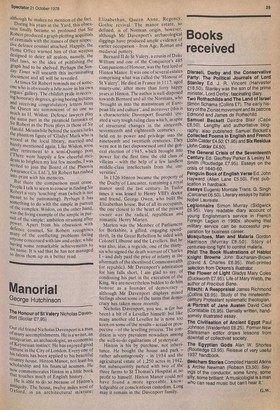On the hook
Christine Verity
In the Office of Constable Robert Mark (Collins £6.95)
I found the opening pages of Sir Robert Mark's memoirs not unevocative of that much more famous autobiography by Neville Cardus. Both men were born into that lower-middle class Manchester milieu where a strange, now almost lost desire to 'better oneself' was tinged with an almost religious devotion to sporting heroes and music. Sir Robert played the clarinet as a boy and sang in a school performance of the Magic Flute. But there the comparison ends. Sir Neville (admittedly a writer by profession) brought everything he wrote to life whereas, Fafner-like, Sir Robert steadily piles up on the page a heap of dreary bureaucratic matter which increasingly makes one feel that one has at last encountered the true Platonic 'form' of the interdepartmental memo.
This has to be pointed out at once o because at least part of the reason why the general reader is likely to be drawn to police memoirs is the hope of gaining some vicarious thrill from peering into the world of the criminal classes. Dostoievsky and Dickens may have spun great literature from the passion and fascination surrounding a life of crime. To Sir Robert the criminal is just another cog in the administrative machine. This may be because he has not met many criminals, since his career has mostly encompassed the administration rather than the practice of law.
None of this is meant to detract from Sir Robert's achievements as Commissioner of the Metropolitan Police, where he earned an almost legendary reputation as the 'thinking copper' (the Mike Brearley of the police force) — the man who devoted himself to such a rigorous clean-up operation within 'the force that more than 400 officers were forced to resign, and who also instituted for the first time a proper system for the investigation of complaints against the police. But, inevitably, in following a career mainly devoted to administrative reforms the luckless reader has to contend with far too many passages like the following: was told abruptly that I was to become Assistant Commissioner (Traffic) without further ado. Andrew Wace . . . was moved from traffic to A Department responsible for all uniformed activities except traffic. I didn't mind, I liked traffic.'
Most autobiographies seem to require a running villain or scapegoat to add spice to their narrative. As Sir Robert does not seem to take a great deal of interest in criminals, it is interesting to speculate where the knife is going to be put in. The first clue appears on p.77. With a passing reference (far too sweeping, in any case) to their immunity from the criminal law, lawyers are the group of people he has least time for. The theme is developed later with considerable passion. It is not however, that he detests all lawyers (which would be understandable). His hostility is particularly reserved for defence lawyers.
On the whole, these allies of the criminal classes are 'bent' and have the added advantage of operating in a system which is wholly weighted on the criminal's side. In fact their readiness to accept bribes from criminals is likely to bring the country to near-anarchy. Quoting Lord Mansfield, Sir Robert accuses barristers of attempting to 'get robbers off the hook' (surely, within reason, this is part of their job) and packing juries with `illiterates and unemployables'. As for the latter, these `illiterates and unernployables' are jurors quite legally 'on offer' since the dropping of the property qualification for jury service. As for 'packing the jury' Sir Robert must be pleased that the number of jurors who can be challenged by the defence dropped last year from 7 to 3 — although he makes no mention of the fact. During his years at the Yard, this obsession finally became so profound that Sir Robert produced a graph plotting acquittals of criminals with the names of their respective defence counsel attached. HapPilY, the Home Office warned him of that weapon designed to deter all zealots, namely, the libel laws, so the idea of publishing the graph had to be shelved. Perhaps the Sunday Times will unearth this incriminating document and all will be revealed.
At times Sir Robert reminds me of someone who is obviously a bete noire in his own rogues, gallery. The childish pride in receiving honorary degrees, giving boring lectures and receiving congratulatory letters from the Queen are reminiscent of no one so much as H. Wislon. Defence lawyers play the same part in the paranoid fantasies of Sir Robert as the Press plays in those of Sir Harold. Meanwhile-behind the scenes lurks the phantom figure of 'Gladys' Mark who is wooed at the local library, married and barely mentioned again. Like Wislon, soon after retirement to a semi-Quango post (`There were happily a few cheerful incidents to brighten my last few months. I was invited to join the Board of the Phoenix Assurance Co. Ltd.'), Sir Robert has rushed into print with his memoirs. But there the comparison must cease. People I talk to seem to concur in finding Sir Robert a very 'touching' man (which is not meant to be patronising). Perhaps it has something to do with the simple in pursuit of the complex. Wislon, on the other hand, was the living example of the simple in pursuit of the simple: ambition straining after Power. Apart from his obsession with defence counsel, Sir Robert recognises many of the conflicting problems facing nYone concerned with law and order, while having some remarkable achievements to his name. It is sad that he has not managed to dress them up as a bettes read.
4=111111111111.1.111.1







































 Previous page
Previous page